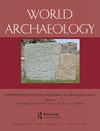The archaeology of a marginal neighborhood in Tehran, Iran: garbage, class, and identity
IF 1.5
2区 历史学
0 ARCHAEOLOGY
引用次数: 4
Abstract
ABSTRACT Tehran’s Archaeology of Garbage project was conducted in 2017–2018 and with the initial aim of monitoring the impacts of currency devaluation on poor people. In Districts 7 and 17, the team investigated two of the most decayed urban fabrics of Tehran as well as the garbage bags of 1004 poor marginalized families. Among these, we managed to find evidence of a forgotten social group, the ‘impoverished middle class’ which consisted of people from the middle-class background who had to move to a neighborhood occupied by low-income classes. The garbage-making behaviors of these two communities were tracked and led to a better understanding of demographic changes and recent protests. In this article, I will present the evidence of poverty in District 17 and will open a new debate on the poor middle-class emerging community and its influence on the new identity of the people living in District 17.伊朗德黑兰一个边缘社区的考古:垃圾、阶级和身份
德黑兰“垃圾考古”项目于2017-2018年开展,最初目的是监测货币贬值对贫困人口的影响。在第7区和第17区,该小组调查了德黑兰两个最腐朽的城市结构,以及1004个贫困边缘化家庭的垃圾袋。在这些人中,我们设法找到了一个被遗忘的社会群体的证据,即“贫困中产阶级”,由来自中产阶级背景的人组成,他们不得不搬到低收入阶层占据的社区。跟踪这两个社区的垃圾制造行为,从而更好地了解人口变化和最近的抗议活动。在这篇文章中,我将展示17区贫困的证据,并将开启一场关于贫困中产阶级新兴社区及其对17区居民新身份的影响的新辩论。
本文章由计算机程序翻译,如有差异,请以英文原文为准。
求助全文
约1分钟内获得全文
求助全文
来源期刊

WORLD ARCHAEOLOGY
ARCHAEOLOGY-
CiteScore
2.60
自引率
0.00%
发文量
32
期刊介绍:
World Archaeology was established specifically to deal with archaeology on a world-wide multiperiod basis. Thirty years after it was founded it remains a leader in its field. The first three of the year"s quarterly issues are each dedicated to a particular theme of current interest. The fourth issue, Debates in World Archaeology, is a forum for debate, discussion and comment. All papers adopt a broad comparative approach, looking at important issues on a global scale. The members of the editorial board and the advisory board represent a wide range of interests and expertise and this ensures that the papers published in World Archaeology cover a wide variety of subject areas.
 求助内容:
求助内容: 应助结果提醒方式:
应助结果提醒方式:


